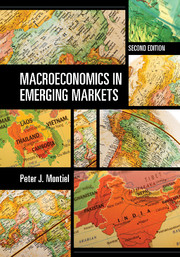Book contents
- Frontmatter
- Contents
- Preface
- PART 1 THE MACROECONOMIC FRAMEWORK
- PART 2 A BENCHMARK MACROECONOMIC MODEL
- PART 3 PUBLIC FINANCE AND MACROECONOMIC PERFORMANCE
- PART 4 MONETARY INSTITUTIONS AND MONETARY POLICY
- 14 Monetary Institutions
- 15 Inflation Targeting
- PART 5 EXCHANGE RATE MANAGEMENT
- PART 6 THE FINANCIAL SECTOR AND MACROECONOMIC PERFORMANCE
- PART 7 VARIETIES OF EMERGING-MARKET CRISES
- Index
- References
15 - Inflation Targeting
Published online by Cambridge University Press: 05 June 2012
- Frontmatter
- Contents
- Preface
- PART 1 THE MACROECONOMIC FRAMEWORK
- PART 2 A BENCHMARK MACROECONOMIC MODEL
- PART 3 PUBLIC FINANCE AND MACROECONOMIC PERFORMANCE
- PART 4 MONETARY INSTITUTIONS AND MONETARY POLICY
- 14 Monetary Institutions
- 15 Inflation Targeting
- PART 5 EXCHANGE RATE MANAGEMENT
- PART 6 THE FINANCIAL SECTOR AND MACROECONOMIC PERFORMANCE
- PART 7 VARIETIES OF EMERGING-MARKET CRISES
- Index
- References
Summary
We saw in the preceding chapter that time-inconsistency problems are likely to induce a pro-inflation bias to monetary policy. We also saw that one way to combat this bias was by making the central bank independent of the government, thereby giving it the power to refuse the finance minister's request for money financing. An independent central bank that does not weigh budget financing as heavily in its objectives as does the finance minister would indeed tend to produce a lower equilibrium rate of inflation, even if acting with complete discretion, than if the optimal inflation decision were made by the finance ministry itself.
However, the preceding chapter also showed that giving the central bank independence is not a panacea: though central-bank independence may reduce pro-inflation bias, an independent central bank may still produce too high a rate of inflation. Specifically, when the central bank is unable to precommit to following through on its policy announcements, and thus acts with discretion every period, the equilibrium rate of inflation will tend to be higher than is desirable, as long as the central bank cares about both output and inflation. In the absence of an independent mechanism to make the central bank's policy announcements credible, a preoccupation with its reputation does not solve this problem. A central bank that can only establish anti-inflationary credibility by consistently delivering low inflation in the face of the public's expectation of higher inflation purchases its anti-inflationary credibility at the cost of what may be a prolonged recession.
- Type
- Chapter
- Information
- Macroeconomics in Emerging Markets , pp. 346 - 366Publisher: Cambridge University PressPrint publication year: 2011



